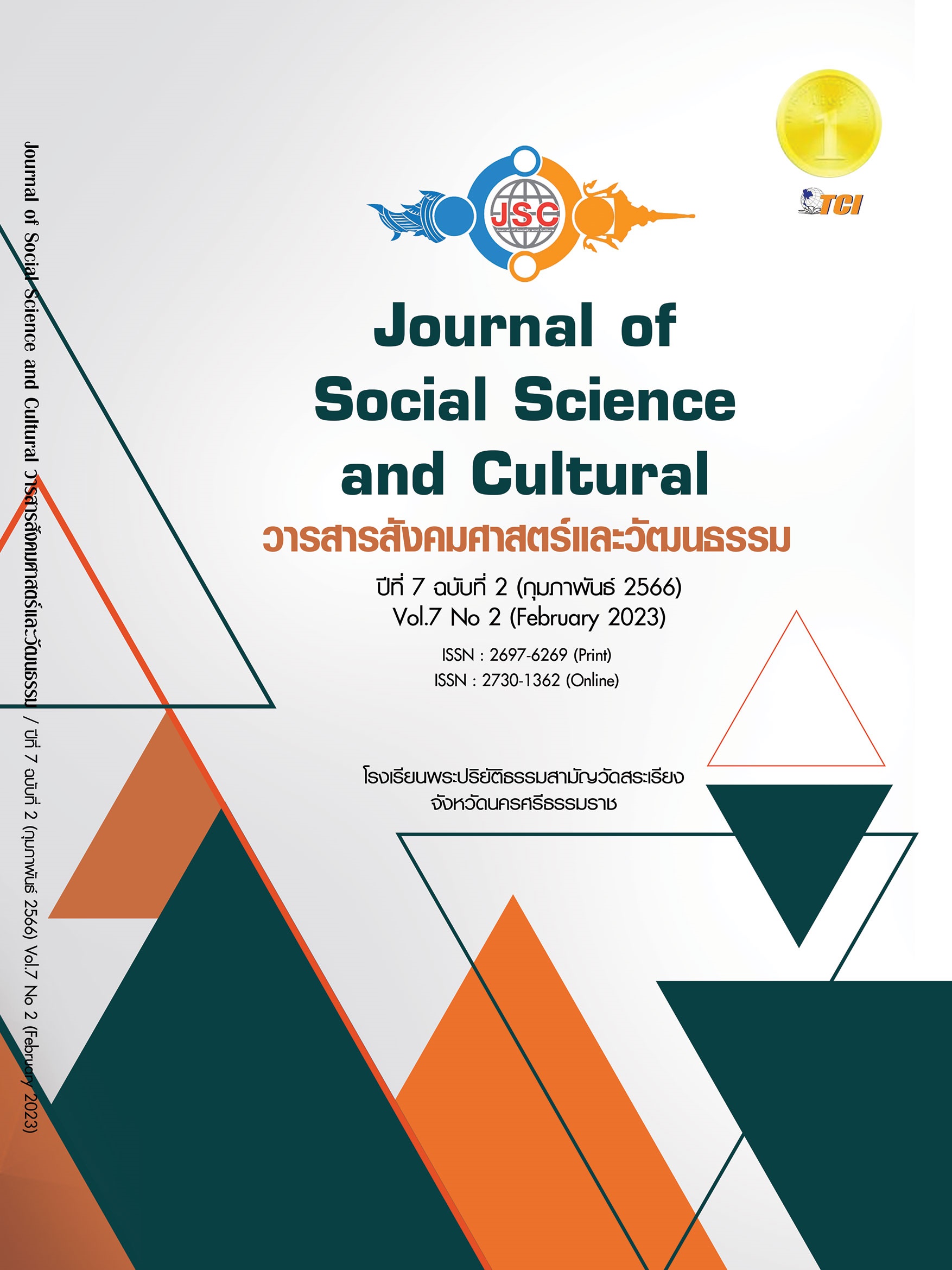THE UNDERSTANDING ABOUT GOOD GOVERNANCE OF GOVERNOR'S OFFICE PERSONNEL IN SOUTHERN THAILAND
Main Article Content
Abstract
The objectives of this research were to 1) study the knowledge and understanding of good governance principles for good home affairs management of provincial office personnel in southern Thailand and 2) compare the management conditions and corporate governance in line with good governance principles of provincial offices varied by personal factors. The population of this quantitative research was 626 heads and general officials of provincial offices in southern Thailand. The sample consisted of 239 participants randomly selected from three provinces, namely, Phatthalung, Trang and Songkhla. The data was collected from all cooperative personnel through a set of questionnaires and analyzed by frequency, percentage, mean, standard deviation, T-test, and F-test. The research showed that 1) the provincial office personnel had the mean of the knowledge and understanding of good governance principles for good home affairs management in total of 9 aspects at 6.10 points (SD =2.89); sorted in descending order, they were transparency, efficiency, responsiveness, participation, responsibility, effectiveness, rule of law, decentralization, and equality, respectively. 2) The provincial office personnel with different genders, ages, education levels, years’ experience, and positions had different opinions on the management conditions and corporate governance in line with good governance principles statistically significant at .01. The provincial offices should promoting the exchange of knowledge and experiences among personnel in order to gain more knowledge and understanding of good governance principles for home affairs management and create an atmosphere of management and corporate governance in line with good governance principles
Article Details
References
จันทร์ฉาย น้อยห้างหว้า. (2556). ความเข้าใจหลักธรรมาภิบาลของบุคลากรสำนักพัฒนาระบบบริหารงานบุคคลส่วนท้องถิ่น กรมส่งเสริมการปกครองท้องถิ่น. ใน สารนิพนธ์รัฐประศาสนศาสตรมหาบัณฑิต สาขาวิชารัฐประศาสนศาสตร์. วิทยาลัยทองสุข.
นันทนา ดำริเข้มตระกูล. (2556). ความเข้าใจหลักธรรมาภิบาลของข้าราชการพลเรือนในพระองค์พระราชวังสนามจันทร์ สำนักพระราชวัง. ใน สารนิพนธ์รัฐประศาสนศาสตรมหาบัณฑิต สาขาวิชารัฐประศาสนศาสตร์. วิทยาลัยทองสุข.
ปธาน สุวรรณมงคล. (2558). การบริหารงานภาครัฐกับการสร้างธรรมาภิบาล. กรุงเทพมหานคร: สถาบันพระปกเกล้า.
สมบัติ ภูศรีฤทธิ์. (2553). ความคิดเห็นของข้าราชการต่อการบริหารงานตามหลักธรรมาภิบาลขององค์การบริหารส่วนจังหวัดหนองคาย. ใน วิทยานิพนธ์รัฐประศาสนศาสตรมหาบัณฑิต. มหาวิทยาลัยราชภัฎมหาสารคาม.
สำนักงานเลขานุการของคณะกรรมการยุทธศาสตร์ชาติ. (2561). แผนยุทธศาสตร์ชาติ 20 ปี ประเทศไทย. กรุงเทพมหานคร: สำนักนายกรัฐมนตรี.
สำนักงานคณะกรรมการพัฒนาการเศรษฐกิจและสังคมแห่งชาติ. (2559). แผนพัฒนาเศรษฐกิจและสังคมแห่งชาติฉบับที่ 12 (พ.ศ. 2560-2564). กรุงเทพมหานคร: สำนักนายกรัฐมนตรี.
สำนักงานคณะกรรมการพัฒนาระบบราชการ. (2552). คู่มือการจัดระดับการกำกับดูแลองค์การภาครัฐตามหลัก ธรรมาภิบาลของการบริหารกิจการบ้านเมืองที่ดี. กรุงเทพมหานคร: บริษัท ฟรีเมียร์โปร จำกัด.
สำนักงานปลัดกระทรวงมหาดไทยของสถาบันดำรงราชานุภา. (2556). ประเมินระดับความสำเร็จของการพัฒนาองค์กรตามหลักธรรมาภิบาลของสำนักงานปลัดกระทรวงมหาดไทย. ใน รายงานวิจัยสถาบันดำรงราชานุภาพ. สำนักงานปลัดกระทรวงมหาดไทย.
สำนักนายกรัฐมนตรี. (2532). เขตตรวจราชการ. เรียกใช้เมื่อ 16 ตุลาคม 2557 จาก https://th.wikipedia.org/wiki/เขตตรวจราชการ
Yamane, T. (1967). Taro Statistic : An Introductory Analysis. New York: Harper &row.


